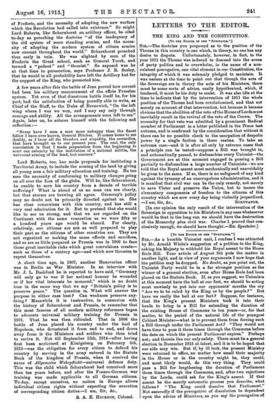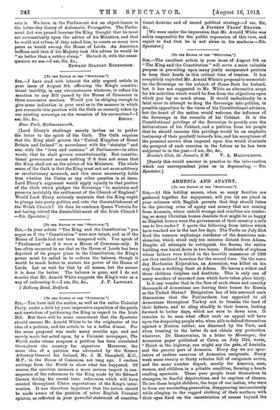[To TEX EDITOR or TH/ “Srscriros."]
Ste,—As a humble Unionist unit, I confess I was attracted by Mr. Arnold White's suggestion of a petition to the King, asking his Majesty to withhold his Royal assent to the Home Rule Bill. Your article of August 9th puts the matter in another light, and in view of your arguments I now hope that the petition may be dropped. No doubt, as you point out, the Unionist Party would be in a far stronger position as the winner of a general election, even after Home Rule had been placed on the Statute Book. If, as you suggest, we Unionists at this moment have the ball at our feet, we should be acting most unwisely to put into our opponents' mouths the cry "Are we to be ruled by the King or by the people P" But have we really the ball at our feet P Suppose, for instance, that the King's present Ministers took it into their heads to bring in a Bill for extending the duration of the existing House of Commons to ten years—or, for that matter, to the period of the natural life of the youngest Cabinet Minister—what is to prevent them from forcing such a Bill through under the Parliament Act? "They would not have time to pass it three times through the Commons before the date on which the present Parliament expires." Perhaps not; and therein lies our only safety. There must be a general election in December 1915 at latest, and it is to be hoped that our side may win. But if, by ill lack, the present Ministry were returned to office, no matter how small their majority in the House or in the country might be, they could, and most likely would, do this very thing. They could pass a Bill for lengthening the duration of Parliament three times through the Commons, and, after two rejections by the Lords, could ask for the King's assent. If that assent be the merely automatic process you describe, what follows ? " The King could dissolve that Parliament." Not assuredly if the prerogative of dissolution be dependent upon the advice of Ministers, as you say the prerogative of veto is. We have in the Parliament Act an object-lesson in the latter-day theory of Automatic Prerogative. The Parlia- ment Act was passed because the King thought that he must act automatically upon the advice of his Ministers, and that he could not refuse, if they asked him, to create as many new peers as would swamp the House of Lords. An American buffoon said that if his Majesty took this advice be would be "no better than a rubber stamp." He took it, with the conse- quences we see.—I am, Sir, &c., EDWARD STANLEY ROBERTSON.



































 Previous page
Previous page